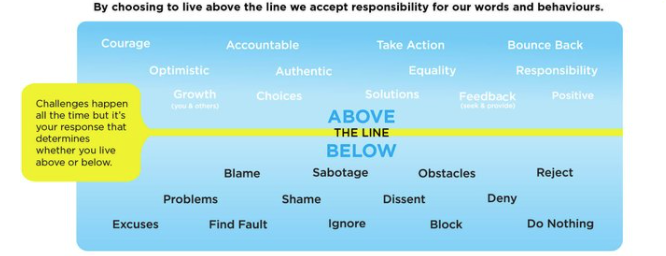Personal Leadership, what is it? The importance of Personal Leadership and action steps to assist you to master it.
I have always had an interest in people and I love to listen to their stories of success or failure. I am particularly interested in those people who rise out of perceived failure and turn their life around. I want to know what they did and how they achieved it. Was it through grit and determination, personal reflection and prayer, or daily activities that would shape and change their life? In every case, these people have displayed Personal Leadership.
Personal Leadership can be best summarised in the last two lines of William Henley’s 1888 poem, Invictus.
'I am the master of my fate:
I am the Captain of my soul.'
It is important to be aware that you are not the victim of circumstance. Instead, you are the one who chooses how to react to life’s situations. You are also the one who will lead yourself from being a victim to becoming a victor: you are the only one who can do this. One of my favourite historic leaders is Nelson Mandela. He displayed the values of inner strength, moral courage, compassion and (more importantly for me) he conquered the art of Personal Leadership. It has been said that during his 27 years’ incarceration at Robben Island prison, he would recite Invictus to other prisoners and use this to assist them to develop their own Personal Leadership.
The first aspect of Personal Leadership is self-awareness. Self-awareness is where you are mindful of your thoughts, feelings, actions and behaviours. Self-awareness is required before you can lead yourself. This aspect of Personal Leadership is not a quick fix, nor is it something that can be done haphazardly. In fact, it takes daily commitment. It is about being cognisant during every second, every minute and every hour within your day, of your thoughts, feelings, behaviours and actions. In this article I will discuss how you can achieve and implement self-awareness throughout your day.
The second aspect of Personal Leadership is to be aware of your core values. Do you have any? If not, start with the Army’s core values of Courage, Initiative, Respect and Teamwork. Core values act as your personal GPS. You need to know what things you believe are important. Are they family, work, relationships, career, a healthy mind, spiritual connection or something else? Understanding your priorities helps you create a vision of how you want to live your life. For example, my core values include: communication, compassion, honesty, integrity, and relationships. In my daily life, I need to ask myself, am I aligning to my core values? For example, if I spent every moment of my life consumed about work and completely disregarded my family and friends, I would not be congruent with my core values. I know that previously, when I was not living my life in alignment with my core values, my life felt like it was falling apart in many different ways: my relationships broke down; I felt run down physically and spiritually; and I felt that I was not “winning in life”. Whereas, when I am living in alignment with my values I feel content and happy; choices I make occur easily and I perceive that my life is on track. This sheet of Dominant Values in Australian Society that may assist you with developing your own.
A great tool that I have used to assist with self-awareness is the 'Above the Line/ Below the Line' Guide. Essentially you imagine that the line is the horizon; if you are above the line, you are breathing and if you are below the line, you are drowning! The model uses behaviours, feelings and actions to assist you to determine where you are.

Courtesy of changeready.com.au
If you are experiencing feelings such as anger, resentment or worry about what is happening in your life, you can use it to confirm that these are 'below the line' feelings. Once you are aware of this, you can then make a choice to do something to get you 'above the line'. Use the guide often and it will help you become aware of how you are living your life and, more importantly, if you are aligning to your core values. I can guarantee living above the line allows you to live your life with happiness and freedom.
The last tool is the Three Step Wonder. When you are living below the line and having difficulty getting above it, try these three steps:
1. Feel the feeling fully.
2. Say what needs to be said.
3. Make another choice!
As a personal example, I chose to undertake my current position at the Warrant Officer and Non-Commissioned Officer Academy (WONCO-A) as a Member with Dependents Unaccompanied (MWD (U)). At first, when I left my family to take up my posting I became overcome with sadness. When I felt the pain fully, I realised that this feeling was very similar to how I felt when I was at boarding school as an eleven year old; in both cases I missed my family terribly. To assist me from drowning in my sadness, I followed step one and acknowledged my feelings. I then stated how sad I was leaving everyone, how lonely I was and how I wished I was home with them. Once I acknowledged my feelings and emotions fully, I was then able to make another choice, which was to see the positive aspects of my situation and what I can do to be happy whilst being away from my family. This is something that I choose to do when I have a feeling that is 'below the line', and depending on my mood I might need to do this activity a few times to examine my different emotions. This takes only a few moments to complete and can be extremely helpful in your life.
Using these tools, and a daily commitment to being self-aware, best summarise how I became the 'Captain of my soul'. At all times I decide how I choose to feel, think, behave and act. I am not the victim of circumstance; I am the 'master of my fate' and I have never felt happier. Will you make a daily commitment to lead your best life? Use these tools to assist you (like I did) to achieve the art of Personal Leadership.









